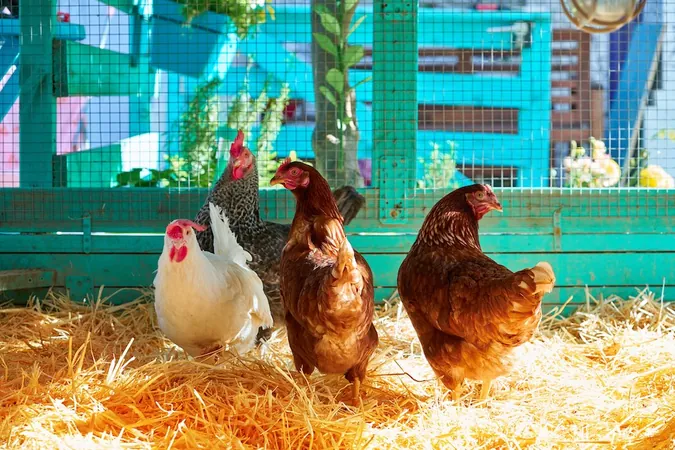
Backyard Chickens in Vancouver: What You Need to Know Before You Start
2024-11-21
Author: Benjamin
Are you thinking about raising backyard chickens in Vancouver? While city regulations permit certain residents to keep a small flock, there are critical guidelines and potential challenges you must consider before making the leap.
In Vancouver, residents are allowed to keep up to four hens, provided they are over four months old. Roosters are strictly prohibited, and potential chicken owners must register their birds and acquire the necessary permits. It's also essential to inform the city if you decide to stop keeping chickens, maintaining compliance with local regulations.
Currently, the Animal Control By-law prohibits any fowl other than hens from being kept in backyards. However, a city spokesperson has indicated that revisions to the by-law may be undertaken to clarify which bird species are permissible, likely reflecting the growing interest in urban poultry farming.
Despite the joys of raising chickens, it's essential to tread carefully—especially in light of recent health concerns. Health Canada recently reported a case of H5N1 avian influenza involving a teenager in Richmond, igniting fears about the virus's potential spread in British Columbia. Although there have been no other human cases detected, this incident highlights the importance of following health guidelines for poultry owners.
A city representative has assured that avian influenza has not currently influenced the city's chicken keeping regulations. They say that while some may feel it's a riskier time to keep birds, there have been no specific warnings issued by public health officials. However, those with backyard coops should remain informed about health and safety recommendations to protect both their poultry and themselves.
Considering a chicken coop? While fresh eggs and fertilizer for your garden can be enticing rewards, owning chickens comes with responsibilities. Chickens require daily feeding, regular health check-ups, and meticulous care. They can live for over 14 years, making them a long-term commitment akin to other household pets.
Moreover, the costs associated with maintaining a chicken coop can be surprisingly high. Beyond the basics of food and bedding, owners must invest in tools, security measures, proper housing, and more to ensure their hens' needs are met. The city suggests that prospective hen keepers allocate at least one hour each day for tasks including cleaning, feeding, and socializing with the birds, as chickens thrive in flocks and do better with company.
Potential owners should also consider their environment. Homes near busy streets or loud areas might scare the birds, leading to distress. The city advises that housing two or more chickens is optimal, as they are social creatures.
H5N1, the avian influenza subtype, primarily affects birds but can also infect mammals and, in rare instances, humans. Canada currently reports just one human case, but the U.S. has seen 52 cases confirmed, indicating a pressing concern about the virus.
Transmission primarily occurs through close contact with infected animals or environments, such as farms or markets. Given the current prevalence of avian flu, caution is warranted, as negligence in caring for infected animals could have legal ramifications. Legal expert Kyla Lee warns that owners could be held liable should their chickens be involved in an outbreak.
Beyond health risks, chicken owners might also encounter legal challenges related to nuisance claims. For instance, excessive noise or foul odors from a poorly managed coop could lead to disputes with neighbors. In densely populated areas, attracting pests or animals seeking food could create additional layers of complexity and potential legal battles.
If you find that chicken ownership is not right for you in the long term, it's important to notify the city and find alternatives for your hens. Backyard slaughtering is outright banned for health and safety reasons, along with community concerns about noise, smell, and humane treatment of animals—elements the city prioritizes in its regulations.
In conclusion, owning backyard chickens in Vancouver can be a rewarding endeavor if approached with careful consideration of the rules, costs, and responsibilities involved. Keep yourself informed, ensure you have a commitment to these wonderful birds, and carefully weigh the pros and cons before building that hen coop!









 Brasil (PT)
Brasil (PT)
 Canada (EN)
Canada (EN)
 Chile (ES)
Chile (ES)
 España (ES)
España (ES)
 France (FR)
France (FR)
 Hong Kong (EN)
Hong Kong (EN)
 Italia (IT)
Italia (IT)
 日本 (JA)
日本 (JA)
 Magyarország (HU)
Magyarország (HU)
 Norge (NO)
Norge (NO)
 Polska (PL)
Polska (PL)
 Schweiz (DE)
Schweiz (DE)
 Singapore (EN)
Singapore (EN)
 Sverige (SV)
Sverige (SV)
 Suomi (FI)
Suomi (FI)
 Türkiye (TR)
Türkiye (TR)